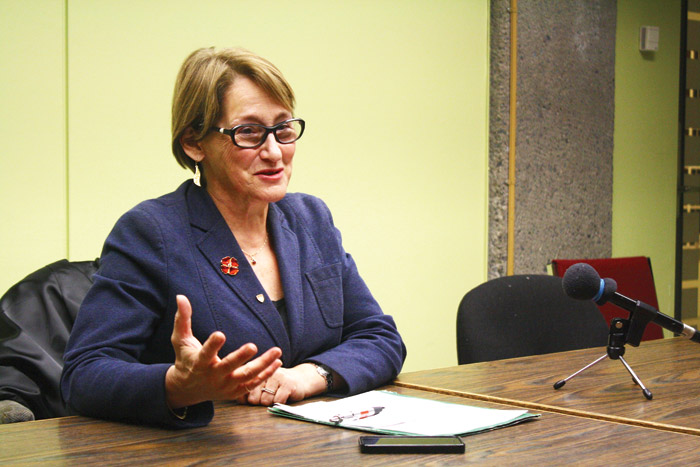On Wednesday, Nov. 12, Principal Suzanne Fortier sat down with members of the McGill media to talk about issues concerning the McGill community, including the ongoing talks on Quebec’s bilateral agreement with France regarding tuition and the financial troubles McGill is facing resulting from provincial austerity measures.
Bilateral agreement between France and Quebec
Earlier this year, the provincial government announced that it would be reviewing the terms of the 1978 bilateral agreement to possibly increase the ratespaid by French citizens to that of non-Quebecois Canadian residents. According to the bilateral agreement between Quebec and France, French citizens are allowed to pay the same rates of tuition as Quebec residents. An article in the Montreal Gazette estimated that the current rate of tuition for French citizens is costing Quebec about $50 million per year.
According to Fortier, any increases to tuition for French citizens would be accompanied with an expansion of McGill’s bursary program, which gives need-based financial aid through grants to students. All students—international and Canadian—will be able to apply for the bursaries.
“I personally think that indeed, the agreement has to be revisited,” Fortier said. “We need to make sure that we continue building our bursary program [….] We’re a university where we try to bring together people who are very smart and interested in being a very diverse community, and so the only way we can do that is by having a strong bursary program that will [also] apply to French students.”
Fortier continued to explain that new partnerships between McGill and French institutions that Quebec students could take advantage of were also being explored by McGill.
“There is not enough interest [for] Quebec students to go [to] France and [to] the universities participating in such exchange programs, because the more prestigious universities are not in the framework of this exchange,” Fortier stated. “We can explore those new partnerships—it would be interesting.”
Austerity measures
In September, the provincial government announced that $172 million would be cut from their 2014-2015 budget for the university sector. Consequently, McGill could accumulate a deficit of up to $34 million in a worst-case scenario for the 2014 fiscal year. Fortier spoke to the impact these cuts would have on McGill students as recently funds for services such as the Arts Internship Office (AIO) and 24-hour library access have been partially shifted from McGill to students in the form of embedded fees.
“I am not scared that [we will] become a university for the rich […] because we have implanted politics in order to ensure that this does not happen,” Fortier said in addressing a concern that McGill would be increasingly financially inaccessible as a result of these increased fees. “We do not look at the financial situation of our students when we offer a place at McGill. We have a bursary program, that in my opinion, [is] the best bursary program per student in Canada.”
According to Fortier, the provincial government’s cuts are a harsh but necessary measure.
“I am not, as a citizen, opposed to [the Quebec government’s] goal of reaching a balanced budget,” she said. “I think it’s important for the long term. I believe [that] the more we live outside of what we can afford in the long term, the more we’ll create an unstable situation for this province. I understand that it’s not an easy reality. It’s not something we like to see—cuts after cuts.”










http://montrealgazette.com/news/quebec/french-presient-francois-hollande-visits-quebec-and-montreal
It looks like the bi-lateral agreement will stand as it is.